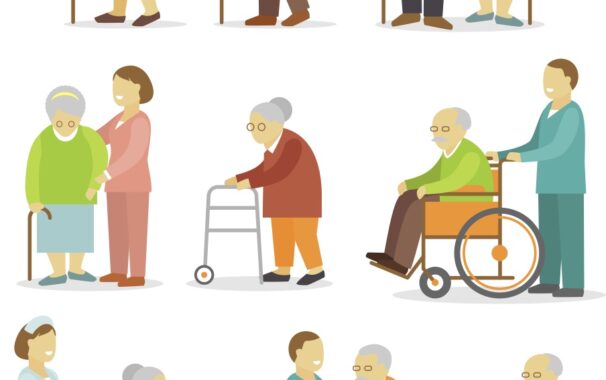
R.K. transferred her one-third interest in a house she owned jointly with her daughter and son-in-law to her daughter. Less than five years later, R.K. applied for Medicaid, and asserted that the transfer was exempt under Medicaid’s “caregiver child” exception to the rules prohibiting any transfers of assets within five years of the Medicaid application date. The Cape May County Board of Social Services, disagreed and imposed a 199 day penalty for the transfer. R.K. appealed.
On appeal, an ALJ reversed the agency determination, finding the house transfer was exempt. The Director of Medicaid reversed and remanded the case back to the agency on two issues: (1) to determine R.K.’s medical condition in the two years prior to institutionalization, and (2) to determine who paid for R.K.’s care costs in the two years prior to institutionalization.
At the second hearing, several witnesses testified as to R.K.’s medical condition in the two years prior to institutionalization, and the applicant’s medical records and care plans were also submitted. At the conclusion of the hearing, the ALJ concluded that the medical records established R.K.’s need for care during the two years prior to institutionalization. The ALJ also found the applicant’s care costs were paid by Medicare, but that payment for care by the applicant’s insurance company could not be considered when determining if the care provided by the “caregiver child” was the reason R.K. was able to remain home and out of the institution. The ALJ found, for a second time, that the house transfer was exempt under the “caregiver child” exemption. The Director again reversed the ALJ’s ruling, finding that (1) no medical records were submitted to the ALJ for a six month period during the two years prior to institutionalization; and (2) the applicant’s insurance provider paid for care during the applicable time period, not the alleged “caregiver child.” I blogged about the case here.
The applicant then appealed to the Superior Court, Appellate Division, and Medicaid’s decision was affirmed based on a lack of evidence concerning the applicant’s medical condition. The court declined to reach to the applicant’s other claim, that Medicaid wrongly determined that the care allowing the applicant to remain at home had to be provided by her daughter, rather than from other services:
The Division’s determination concerning the regulations was a second and alternate ground for rejecting the ALJ’s determination. We have already accepted the first ground, which was that there were no records establishing R.K.’s medical condition between March 2013 and up to early November 2013.
A copy of R.K. v. DMAHS can be found here – R.K. v. Division of Medical Assistance and Health Services (App.Div.)
For additional information concerning Medicaid applications and appeals, visit:
For additional information concerning Medicaid and public benefits planning, visit:
Categories
- Affordable Care Act
- Alzheimer's Disease
- Arbitration
- Attorney Ethics
- Attorneys Fees
- Beneficiary Designations
- Blog Roundup and Highlights
- Blogs and Blogging
- Care Facilities
- Caregivers
- Cemetery
- Collaborative Family Law
- Conservatorships
- Consumer Fraud
- Contempt
- Contracts
- Defamation
- Developmental Disabilities
- Discovery
- Discrimination Laws
- Doctrine of Probable Intent
- Domestic Violence
- Elder Abuse
- Elder Law
- Elective Share
- End-of-Life Decisions
- Estate Administration
- Estate Litigation
- Estate Planning
- Events
- Family Law
- Fiduciary
- Financial Exploitation of the Elderly
- Funeral
- Future of the Legal Profession
- Geriatric Care Managers
- Governmental or Public Benefit Programs
- Guardianship
- Health Issues
- Housing for the Elderly and Disabled
- In Remembrance
- Insolvent Estates
- Institutional Liens
- Insurance
- Interesting New Cases
- Intestacy
- Law Firm News
- Law Firm Videos
- Law Practice Management / Development
- Lawyers and Lawyering
- Legal Capacity or Competancy
- Legal Malpractice
- Legal Rights of the Disabled
- Liens
- Litigation
- Mediation
- Medicaid Appeals
- Medicaid Applications
- Medicaid Planning
- Annuities
- Care Contracts
- Divorce
- Estate Recovery
- Family Part Non-Dissolution Support Orders
- Gifts
- Life Estates
- Loan repayments
- MMMNA
- Promissory Notes
- Qualified Income Trusts
- Spousal Refusal
- Transfers For Reasons Other Than To Qualify For Medicaid
- Transfers to "Caregiver" Child(ren)
- Transfers to Disabled Adult Children
- Trusts
- Undue Hardship Provision
- Multiple-Party Deposit Account Act
- New Cases
- New Laws
- News Briefs
- Newsletters
- Non-Probate Assets
- Nursing Facility Litigation
- Personal Achievements and Awards
- Personal Injury Lawsuits
- Probate
- Punitive Damages
- Reconsideration
- Retirement Benefits
- Reverse Mortgages
- Section 8 Housing
- Settlement of Litigation
- Social Media
- Special Education
- Special Needs Planning
- Surrogate Decision-Making
- Taxation
- Technology
- Texting
- Top Ten
- Trials
- Trustees
- Uncategorized
- Veterans Benefits
- Web Sites and the Internet
- Webinar
- Writing Intended To Be A Will







Vanarelli & Li, LLC on Social Media